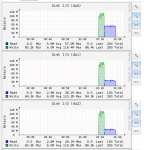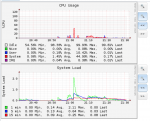Stanri010
Explorer
- Joined
- Apr 15, 2014
- Messages
- 81
I've got 6x 4TB WD red drives hooked up to a HBA powered by a Xeon E3 1245v3 with 32GB of ecc ram. I ran a performance test in the system options and the output file looked like this:

It looks like it's saying my write speeds were in the mid 450mb/s while my read speeds were around 210mb/s. Is this to be expected by a raidz2 configuration? The graphs seem to correlate to what the output file shows. What kind of performance bump can I expect if I were to drop down to a raidz1 config? What can you do to bring that performance up to saturate 10GbE?
*Thinking about a hypothetical 10 GbE setup and my theoretical max*
Iozone: Performance Test of File I/O
Version $Revision: 3.420 $
Compiled for 64 bit mode.
Build: freebsd
Contributors:William Norcott, Don Capps, Isom Crawford, Kirby Collins
Al Slater, Scott Rhine, Mike Wisner, Ken Goss
Steve Landherr, Brad Smith, Mark Kelly, Dr. Alain CYR,
Randy Dunlap, Mark Montague, Dan Million, Gavin Brebner,
Jean-Marc Zucconi, Jeff Blomberg, Benny Halevy, Dave Boone,
Erik Habbinga, Kris Strecker, Walter Wong, Joshua Root,
Fabrice Bacchella, Zhenghua Xue, Qin Li, Darren Sawyer,
Vangel Bojaxhi, Ben England, Vikentsi Lapa.
Run began: Wed Feb 11 21:09:15 2015
Record Size 128 KB
File size set to 41943040 KB
Command line used: /usr/local/bin/iozone -r 128 -s 41943040k -i 0 -i 1
Output is in Kbytes/sec
Time Resolution = 0.000001 seconds.
Processor cache size set to 1024 Kbytes.
Processor cache line size set to 32 bytes.
File stride size set to 17 * record size.
random random bkwd record stride
KB reclen write rewrite read reread read write read rewrite read fwrite frewrite fread freread
41943040 128 433565 464058 211254 210979
iozone test complete.

It looks like it's saying my write speeds were in the mid 450mb/s while my read speeds were around 210mb/s. Is this to be expected by a raidz2 configuration? The graphs seem to correlate to what the output file shows. What kind of performance bump can I expect if I were to drop down to a raidz1 config? What can you do to bring that performance up to saturate 10GbE?
*Thinking about a hypothetical 10 GbE setup and my theoretical max*

